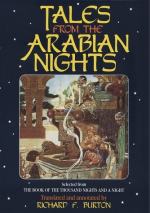[FN#5] I have hitherto translated “wa adraka (masc.) Shahrazada al-Sabah,” as=And Shahrazad perceived the dawn of day; but it is more correct as well as more picturesque to render the phrase “was surprised (or overtaken) by the dawn.”
[FN#6] Arab. “’Adran,"=much and heavy rain.
[FN#7] For “Halwa” see vol. ii. pp. 47-212. Scott (vol. vi. 413) explains “Hamiz” as “a species of small grain,” probably confounding it with Hummus (or Himmis)=vetches. It is the pop. term for pickles, “sour meat” as opposed to “sweetmeats.” The Arabs divide the camel’s pasture into “Khullah” which means sweet food called bread and into “Hamiz” termed fruit: the latter is composed mainly of salsolaceae, and as camels feed upon it during the hot season it makes them drink. Hence in Al Hariri (Preface) “I change the pasture,” i.e., I pass from grave to gay, from light to dignified style. (Chenery, p. 274).
[FN#8] This is the modern version of the tale which the author of “Zadig” has made familiar to Europe. The hero is brought before the King and Queen of Babylon for stealing a horse and a dog; and, when held by the chief “Destour” (priest) to be a thief, justifies himself. I have given in full the older history from Tabari, the historian (vixit A.D. 839-923). For the tracker ("Paggi”) and the art of tracking see Sind Revisited, i. 180-183. I must again express my wonder that the rural police of Europe still disdain the services of trained dogs when these are about to be introduced into the army.
[FN#9] Arab. “Bita’i"=my own. I have already noticed that this is the Egypt. form and the Nilotes often turn the ’Ayn into an H, e.g. Bitaht for Bita’at, e.g. Ash Shabakah bitaht as-Sayd, thy net for fishing. (Spitta Bey, Contes Arabes Modernes, p. 43.)
[FN#10] Arab. “Mukabbab;” prop. vaulted, arched, domed in Kubbah (or cupola)-shape.
[FN#11] Arab. “Firasah.” “Sciences are of three kinds: one the science of Faith, another the science of Physiognomy (Firasah), and another the science of the Body; but unless there be the science of Physiognomy, other science availeth not.” So says “The Forty Vizirs:” Lady’s vith story and Vizir’s xxxist story. For a note on “Firasah” see vol. viii. 326.
[FN#12] Arab. “In lam tazidd Kayni"=lit. unless thou oppose my forming or composition.
[FN#13] Arab. “Farafish,” a word which I cannot find in the dictionary, and so translate according to the context. Dr. Steingass remarks that the nearest approach to it would be “Farafik” (plur. of Furfak)=fine, thin or soft bread.
[FN#14] See, in the “Turkish Tales” by Petis de la Croix (Weber, Tales of the East, vol. iii. 196), the History of the Sophi of Baghdad, where everything returns to (or resembles) its origin. Thus the Wazir who proposed to cut up a criminal and hang him in the shambles was the self-convicted son of a butcher; he who advised boiling him down and giving his flesh to the dogs was the issue of a cook, and the third who proposed to pardon him was nobly born. See Night cccxli.




